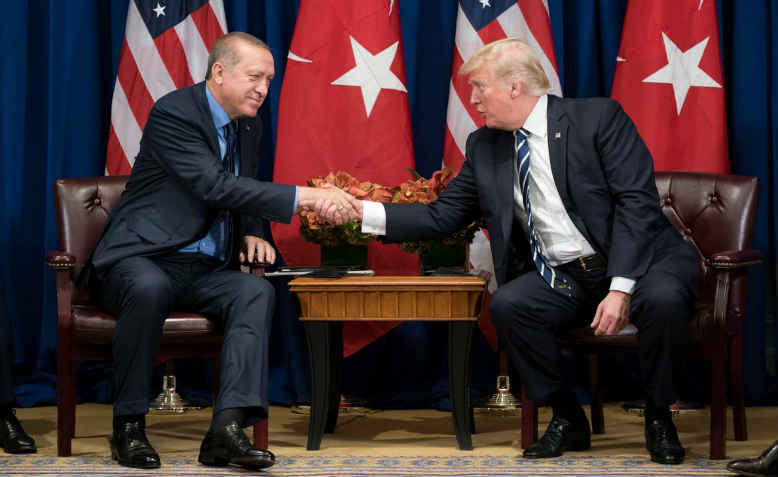 Trump and Erdoğan at the UN, 2017. Photo: wikimedia commons
Trump and Erdoğan at the UN, 2017. Photo: wikimedia commons
The US’s proposed withdrawal pushes the contradictions of Trumpism to breaking point, argues Hilary Stephenson
Shortly before Christmas, Donald Trump announced that the US would withdraw its troops from Syria. The move was widely condemned by the US political establishment and Trump even faced attacks from allies on the Fox News channel. Shortly afterwards, James Mattis, Trump’s defence secretary, resigned.
In the first week of 2019, John Bolton has put the brakes on, in what appears to be a temporary reversal of the decision. Up to 2,000 military personnel will now stay in Syria, Bolton says, until Turkey offers reassurances that it won’t launch a military offensive in north-eastern Syria against the Kurdish YPG.
The vacillation between staying and leaving Syria reflects the tension between, on the one hand, Trump’s desire to deliver a win to please his support base and, on the other, the need to maintain a business-as-usual approach to US imperialism’s interests abroad.
Kurds have long been pawns in the game of US imperialism. The documentary Good Kurds, Bad Kurds: No Friends But the Mountains tells some of that story up until the year 2000, when Saddam Hussein was in the crosshairs for removal.
As the film argued, “Good Kurds” were those in Iraq, because they were Saddam Hussein’s victims that the US said it wanted to help. “Bad Kurds” were those fighting for independence against their oppressor Turkey, an American ally at the receiving end of US arms.
War in Syria added more layers of contradiction to the US relationship with the Kurds. The long-standing enemies of Turkey were now seen as temporary allies in a war that was meant to remove Assad and defeat Isis.
Trump’s announcement should be a reminder that the US is no friend of the Kurds. US “support” will end when the US is ready, even if that leaves the Kurds vulnerable to attack. Of course, if the US were serious about protecting the Kurds, it would immediately end its support for the Turkish regime, but this is never even suggested.
John Bolton’s suggestion of reassurances from Turkey is worthless, and he knows it. In December, the US State Department confirmed $3.5bn of arms sales to Turkey. These transactions signal to President Erdogan and the whole world precisely where US interests lie, stripping away any motive for Turkey to abandon its long-standing hostility to the Syrian Kurds.
Bolton, like other hawks, is really pushing for continuing US presence in the region. But in Afghanistan, the Taliban now controls huge swathes of the country, the war on terror more generally has grown the threat of terror, and President Assad doesn’t look to be going anytime soon. The hawks are losing ground, and Bolton has probably only secured a temporary pause to US withdrawal. These failures of US foreign policy, in combination with a war-weariness back home in the US, are setbacks for US imperialism, but certainly not its end.

